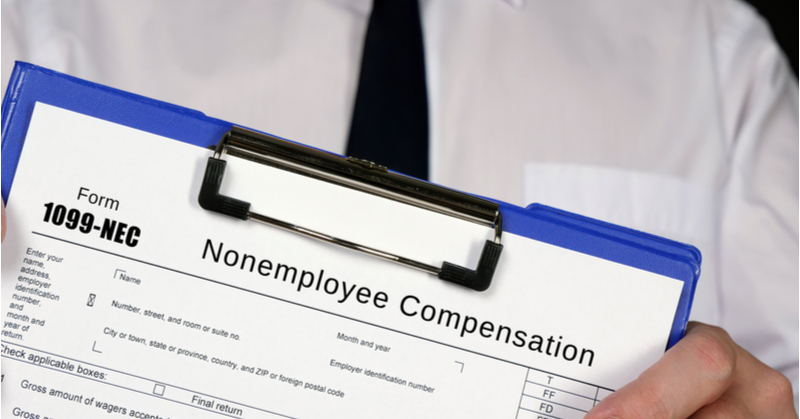When the IRS first revived Form 1099-NEC in 2020, business owners (and yes, some accountants) scrambled. For businesses—including your clients—that were used to filing Form 1099-MISC to report nonemployee compensation, switching things over to the NEC takes some getting used to.
Thankfully, you’re here to help your clients navigate the ins and outs of tax forms, like the 1099-NEC and MISC. Here are some common questions your clients might have (and the answers to each).
What’s the difference between Forms 1099-NEC vs. 1099-MISC?
Both Forms 1099-NEC and 1099-MISC are informational returns that report money a business paid to a contractor or vendor. But, which is which?
- Form 1099-NEC, Nonemployee Compensation: Reports payments made to independent contractors and certain qualifying nonemployee compensation payments
- Form 1099-MISC, Miscellaneous Income: Reports payments and miscellaneous income made to certain vendors
Before 2020, there was one form to report both nonemployee compensation and miscellaneous payments, and its name was Form 1099-MISC. But if you’ve been in the game a while, you might remember that the 1099-NEC isn’t new: It was last used in 1982 before the IRS retired it. So, the 1099-NEC is more of a revival than a brand-new release.
Businesses must split reporting between Forms 1099-NEC and 1099-MISC to separate nonemployee compensation and miscellaneous income expenses. In some cases, your client may need to file both Forms 1099-MISC and 1099-NEC.
When do I use Form 1099-NEC?
Your clients must file a Form 1099-NEC for each person they pay $600 or more in nonemployee compensation, including:
- Services performed by a worker (e.g., independent contractor) who is not an employee, including payments for parts or materials
- Cash payments for fish or other aquatic life purchased from someone engaged in the trade or business of catching fish
- Payments to an attorney for attorney fees
Nonemployee compensation includes:
- Fees
- Commissions
- Prizes
- Awards
- Other forms of compensation for services
IRS resources:
When do I use Form 1099-MISC?
Your clients must file a Form 1099-MISC for each person they paid at least $600 in the following:
- Rents
- Prizes and awards (e.g., merchandise won on game shows).
- Other income payments
- Cash from a notional principal contract to an individual, partnership, or estate
- Any fishing boat proceeds
- Medical and health care payments
- Crop insurance proceeds
- Payments to an attorney for legal services (NOT fees)
- Section 409A deferrals
- Nonqualified deferred compensation
Businesses also need to file a Form 1099-MISC for each person they paid at least $10 to in royalties or broker payments in lieu of dividends or tax-exempt interest.
Heads up! You and your clients might be used to the old version of Form 1099-MISC that had a box for reporting nonemployee compensation. Because businesses must now report nonemployee compensation on the 1099-NEC, pay attention to changes on the 1099-MISC. For example, box 7 used to be for reporting nonemployee compensation. Now, box 7 is for reporting whether the payer made direct sales of $5,000 or more of consumer products for resale.
IRS resources:
What’s the same?
Both Forms 1099-NEC and 1099-MISC have five copies. Regardless of whether your client is filing Form 1099-NEC or 1099-MISC, here’s where those copies go:
- IRS: Copy A
- State tax department (if applicable): Copy 1
- Recipient: Copy B and Copy 2
- Copy C: Filer’s records
Additionally, both forms require the same basic information from your clients. Your clients must enter their and the recipient’s names, addresses, phone numbers, and Taxpayer Identification Number to get started.
Clients must not use Form 1099-NEC or 1099-MISC to report wages paid to employees (those go on Form W-2, Wage and Tax Statement).
And, remind your clients they do not need to prepare a 1099 for credit card payments made to contractors or vendors.
How do the forms impact Form 1096 filing?
Form 1096, Annual Summary and Transmittal of U.S. Information Returns, summarizes each set of 1099s a business sends to the IRS.
Your clients must use the same version of Form 1096, regardless of whether they’re filing Form 1099-NEC or 1099-MISC. But if they need to file both Form 1099-MISC and 1099-NEC, they cannot file only one Form 1096.
Tax preparers must file a separate copy of Form 1096 to accompany each set of forms. That means your client needs to prepare a Form 1096 for their Forms 1099-MISC and a separate Form 1096 for their Forms 1099-NEC.
When is Form 1099-NEC due?
The Form 1099-NEC due date for sending to both recipients and the IRS is January 31 of each year. If the deadline falls on a weekend or holiday, you have until the next business day.
When is Form 1099-MISC due?
Form 1099-MISC due dates depend on where the form is going and whether your client is e-Filing or paper filing:
- Recipient: January 31
- IRS (paper): February 28
- IRS (electronically): March 31
Again, if the deadlines fall on a weekend or holiday, your clients have until the next business day.
What are my state filing responsibilities?
Your clients might also ask you about their 1099 state filing requirements for both the NEC and MISC. Some states require separate filing.
These requirements may vary depending on factors like:
- What form your client is filing
- If your client exceeds a set payment threshold
- Whether your client withheld state tax
Unfortunately, we’re out of time (and space) to include state-by-state 1099-NEC and 1099-MISC filing guidelines. But, that doesn’t mean we’re going to hang you high and dry.
You can download a free copy of state-specific 1099-NEC and 1099-MISC guidelines here for reference or to pass on to your clients.
.png?width=150&height=63&name=TWRlogo-regmark_blueblack%20(1).png)
.png)










Do you have questions about this article? Email us and let us know > info@woodard.com
Comments: